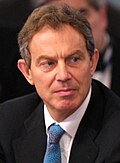1 May 2003 | |||||||||||||||||||||||||||||||||||||||||||||
All 36 metropolitan boroughs, 40 out of 46 unitary authorities, 232 out of 238 English districts and all 32 Scottish council areas | |||||||||||||||||||||||||||||||||||||||||||||
|---|---|---|---|---|---|---|---|---|---|---|---|---|---|---|---|---|---|---|---|---|---|---|---|---|---|---|---|---|---|---|---|---|---|---|---|---|---|---|---|---|---|---|---|---|---|
| |||||||||||||||||||||||||||||||||||||||||||||
 Colours denote council control following elections, as shown in the main table of results. | |||||||||||||||||||||||||||||||||||||||||||||
The 2003 United Kingdom local elections were held on Thursday 1 May 2003, the same day as the Scottish Parliamentary and the Welsh Assembly elections. There were local elections for all councils in Scotland and in most of England. There were no local elections in Wales, Northern Ireland or London.
Contents
- Results
- England
- Metropolitan boroughs
- Unitary authorities
- District councils
- Scotland
- Notes
- References
The ruling Labour Party lost a considerable 833 seats, while both the main opposition parties, Conservative and Liberal Democrat, polled strongly, with the Conservatives enjoying the largest share of the vote. Labour had now been in government for six years and still had a triple-digit majority, and over the summer of 2003 some opinion polls showed the Conservatives level with Labour. However, these were to be the last of the two local council elections contested by the Conservatives under the leadership of Iain Duncan Smith, who was ousted as leader later in the year and succeeded by Michael Howard due to his unpopularity as leader and doubts about his ability to win a general election.
Fifty-nine councils held electoral pilot schemes to try to boost turnout figures. Schemes included all postal voting, mobile polling stations, alterations to voting hours and various kinds of electronic voting. The most successful in raising turnout was all-postal voting which saw turnout rise to an average of 50%. In comparison, turnout across the whole of England was only 33%.


